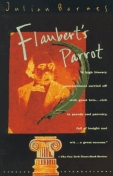BKMT READING GUIDES
Flaubert's Parrot
by Julian Barnes
Paperback : 192 pages
1 club reading this now
0 members have read this book
Just what sort of book is Flaubert's Parrot, anyway? A literary biography of ...
Introduction
A kind of detective story, relating a cranky amateur scholar's search for the truth about Gustave Flaubert, and the obsession of this detective whose life seems to oddly mirror those of Flaubert's characters.
Just what sort of book is Flaubert's Parrot, anyway? A literary biography of 19th-century French novelist, radical, and intellectual impresario Gustave Flaubert? A meditation on the uses and misuses of language? A novel of obsession, denial, irritation, and underhanded connivery? A thriller complete with disguises, sleuthing, mysterious meetings, and unknowing targets? An extended essay on the nature of fiction itself?
On the surface, at first, Julian Barnes's book is the tale of an elderly English doctor's search for some intriguing details of Flaubert's life. Geoffrey Braithwaite seems to be involved in an attempt to establish whether a particularly fine, lovely, and ancient stuffed parrot is in fact one originally "borrowed by G. Flaubert from the Museum of Rouen and placed on his worktable during the writing of Un coeur simple, where it is called Loulou, the parrot of Felicité, the principal character of the tale."
What begins as a droll and intriguing excursion into the minutiae of Flaubert's life and intellect, along with an attempt to solve the small puzzle of the parrot--or rather parrots, for there are two competing for the title of Gustave's avian confrere--soon devolves into something obscure and worrisome, the exploration of an arcane Braithwaite obsession that is perhaps even pathological. The first hint we have that all is not as it seems comes almost halfway into the book, when after a humorously cantankerous account of the inadequacies of literary critics, Braithwaite closes a chapter by saying, "Now do you understand why I hate critics? I could try and describe to you the expression in my eyes at this moment; but they are far too discoloured with rage." And from that point, things just get more and more curious, until they end in the most unexpected bang.
One passage perhaps best describes the overall effect of this extraordinary story: "You can define a net in one of two ways, depending on your point of view. Normally, you would say that it is a meshed instrument designed to catch fish. But you could, with no great injury to logic, reverse the image and define the net as a jocular lexicographer once did: he called it a collection of holes tied together with string." Julian Barnes demonstrates that it is possible to catch quite an interesting fish no matter how you define the net. --Andrew Himes
Discussion Questions
No discussion questions at this time.Book Club Recommendations
Recommended to book clubs by 0 of 0 members.
Book Club HQ to over 90,000+ book clubs and ready to welcome yours.
Get free weekly updates on top club picks, book giveaways, author events and more








